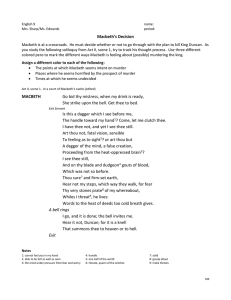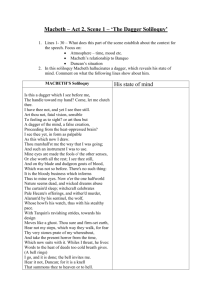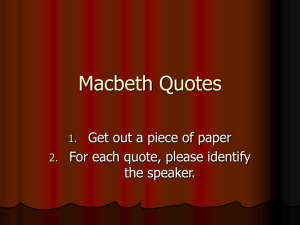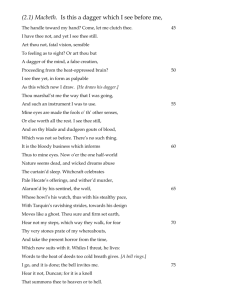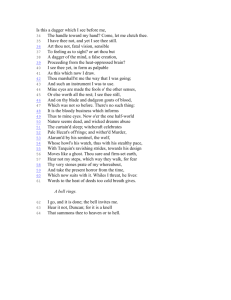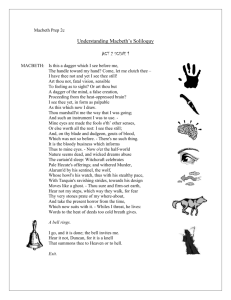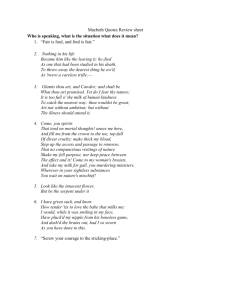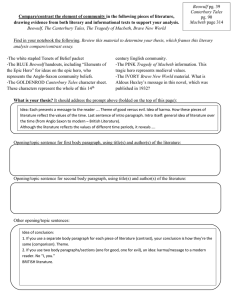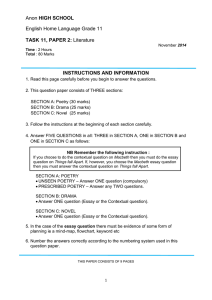AP english IV Fall Midterm 2015 Review
advertisement
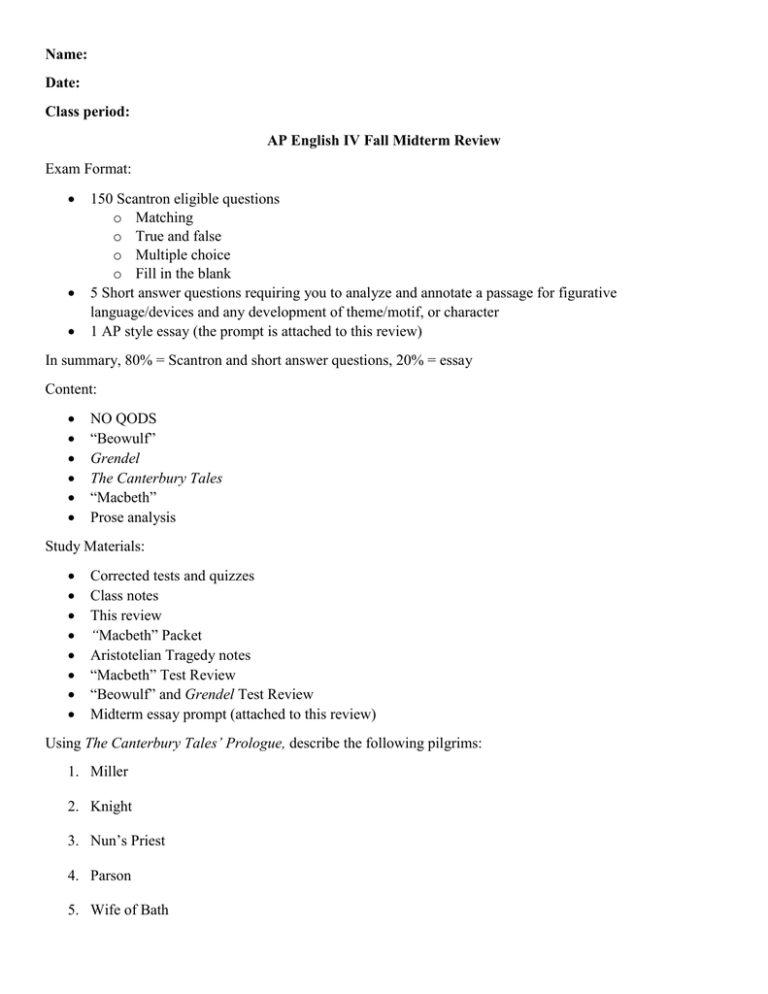
Name: Date: Class period: AP English IV Fall Midterm Review Exam Format: 150 Scantron eligible questions o Matching o True and false o Multiple choice o Fill in the blank 5 Short answer questions requiring you to analyze and annotate a passage for figurative language/devices and any development of theme/motif, or character 1 AP style essay (the prompt is attached to this review) In summary, 80% = Scantron and short answer questions, 20% = essay Content: NO QODS “Beowulf” Grendel The Canterbury Tales “Macbeth” Prose analysis Study Materials: Corrected tests and quizzes Class notes This review “Macbeth” Packet Aristotelian Tragedy notes “Macbeth” Test Review “Beowulf” and Grendel Test Review Midterm essay prompt (attached to this review) Using The Canterbury Tales’ Prologue, describe the following pilgrims: 1. Miller 2. Knight 3. Nun’s Priest 4. Parson 5. Wife of Bath 6. Prioress 7. Physician 8. Franklin 9. Monk 10. Merchant 11. Friar 12. Plowman 13. Summoner 14. Pardoner 15. Reeve 16. Sarjeant at Law Annotate the passage and label devices in the space to the right. Then, on the lines beneath the passage, explain the significance of the following aside/soliloquy from Macbeth. Explain any figurative language/devices and any development of theme/motif, or character. Is this a dagger which I see before me, The handle toward my hand? Come, let me clutch thee. I have thee not, and yet I see thee still. Art thou not, fatal vision, sensible To feeling as to sight? or art thou but A dagger of the mind, a false creation, Proceeding from the heat-oppressed brain? I see thee yet, in form as palpable As this which now I draw. Thou marshall'st me the way that I was going; And such an instrument I was to use. Mine eyes are made the fools o' the other senses, Or else worth all the rest; I see thee still, And on thy blade and dudgeon gouts of blood, Which was not so before. There's no such thing: It is the bloody business which informs Thus to mine eyes. Now o'er the one halfworld Nature seems dead, and wicked dreams abuse The curtain'd sleep; witchcraft celebrates Pale Hecate's offerings, and wither'd murder, Alarum'd by his sentinel, the wolf, Whose howl's his watch, thus with his stealthy pace. With Tarquin's ravishing strides, towards his design Moves like a ghost. Thou sure and firm-set earth, Hear not my steps, which way they walk, for fear Thy very stones prate of my whereabout, And take the present horror from the time, Which now suits with it. Whiles I threat, he lives: Words to the heat of deeds too cold breath gives. A bell rings I go, and it is done; the bell invites me. Hear it not, Duncan; for it is a knell That summons thee to heaven or to hell. _____________________________________________________________________________ ______________________________________________________________________________ ______________________________________________________________________________ ______________________________________________________________________________ ______________________________________________________________________________ ______________________________________________________________________________ ______________________________________________________________________________ ______________________________________________________________________________ ______________________________________________________________________________ ______________________________________________________________________________ _____________________________________________________________________________ ______________________________________________________________________________ ______________________________________________________________________________ ______________________________________________________________________________ ______________________________________________________________________________ ______________________________________________________________________________ ______________________________________________________________________________ ______________________________________________________________________________ ______________________________________________________________________________ ______________________________________________________________________________ ______________________________________________________________________________ ______________________________________________________________________________ ______________________________________________________________________________ ______________________________________________________________________________ Reflecting on all four major works we have studied this semester. Each piece of literature showcases a different type of hero. Trace the concepts of “hero” and “antihero” throughout “Beowulf”, Grendel, The Canterbury Tales (thinking specifically of the knight), and “Macbeth”. Use examples from the texts to support your argument. _____________________________________________________________________________ ______________________________________________________________________________ ______________________________________________________________________________ ______________________________________________________________________________ ______________________________________________________________________________ ______________________________________________________________________________ ______________________________________________________________________________ ______________________________________________________________________________ ______________________________________________________________________________ ______________________________________________________________________________ ______________________________________________________________________________ ______________________________________________________________________________ ______________________________________________________________________________ ______________________________________________________________________________ ______________________________________________________________________________ ______________________________________________________________________________ ______________________________________________________________________________ ______________________________________________________________________________ ______________________________________________________________________________ ______________________________________________________________________________ ______________________________________________________________________________ ______________________________________________________________________________ ______________________________________________________________________________ ______________________________________________________________________________ _____________________________________________________________________________ ______________________________________________________________________________ ______________________________________________________________________________ ______________________________________________________________________________ ______________________________________________________________________________
